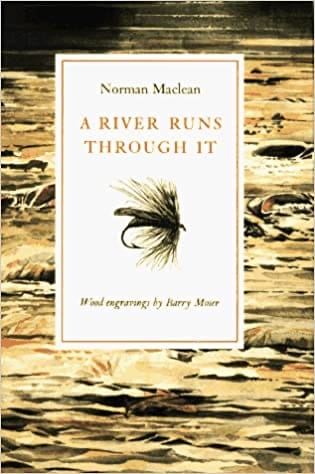My parents were married on September 9, and Labor Day weekend meant they headed west for at least three weeks. There were fish to be caught. With a fly rod.
I wrote in The Joy of Poetry about how my mother came to fly fishing late in life and how after she died, my dad headed still west, but with with other fishing buddies, until it became too far to travel alone. Now he and I live side by side, and both of us want to drive until we find that slippery fish called fall. We might need to go all the way to Montana, where Norman Maclean’s A River Runs Through It is set.
William Stafford, the poet who wrote A Ritual to Read to Each Other, our poem guide since 2020 dawned, was a poet of the American West. His poems “most often take place on a mountainside, a riverbank, or a roadside—‘near an exit.’” On the very first page of this novella, we learn the story takes place at the “junction of great trout rivers.”
In a 1981 Esquire profile of Maclean, Paul Dexter wrote of A River Runs Through It, “It is the truest story I ever read; it might be the best written.”
It was published as fiction, the first fiction title ever released by University of Chicago Press, where Norman Maclean spent his career. It was considered for the Pulitzer Prize in 1977, but no prize was awarded that year. Perhaps because this book reads like memoir. The narrator is Norman, who also had a brother named Paul and a father who was a Scottish Presbyterian minister. The line between memoir and fiction is no more clear than the the sentence that begins the book — “In our family, there was no clear line between religion and fly fishing.”
I never tire of this story. I never catch my limit. It is beautiful. It is not always good. It is True.
You like to tell true stories, don’t you?” [my father] asked, and I answered, “Yes, I like to tell stories that are true.”
Then he asked, “After you have finished your true stories sometime, why don’t you make up a story and the people to go with it?
Only then will you understand what happened and why.
It is those we live with and love and should know who elude us.”
I think that is why Maclean wrote this story, to understand. And yet what he finds in the telling is Mystery.
There is this idea that reading fiction helps us. Then it should follow that writing fiction must also help us. Maclean did not write this story until he was in his 70s. I think it eluded him until then.
Recently, Glynn Young and I were discussing Dancing Prince, the last book in his Dancing Priest series, and we talked about the sometimes-thin line between fiction and memoir. He said some of the relationships in the series were influenced by relationships in his own life (although, of course, Glynn has never been a member of the British royal family). That must be why the books read so true.
I have decided against writing memoir. I have never tried fiction. Perhaps I should wait until I am 70-something. But I have written hundreds of poems. Which are about those I live with and love, who elude me? All of them. I hope some are true.
Cutthroat
Dad plans all day for what will be a one-hour trip
tying flies
gathering vest, hat, waders, net.
We drive our gear down the mountainside
to fish this Wild and Scenic River,
the Rio Grande.
“Where’s your pole” Dad asks.
I hold up a bamboo pole (5 bucks at the gas station).
He frowns, “I’ll go help your mother.”
Fly fishing is the only time she is quiet.
Dad arranges everything just so,
just the way she likes it.
The air is cool, but not
the midday sun. Mosquitoes
everywhere.
Me and my cheap pole can’t fish and I can’t
care as I stand in the freezing river and watch Mom
watch the water.
Dad watches her
cast her line despite the tumor deep in her eye
turning the waves sepia.
Still she is the first to spy
the cutthroat trout
darting right toward Dad.
He sets the hook. Keeps
the tension. Extends the net.
“Get the camera!” he yells.
I drop my pole, paw through Orvis bags but
no camera.
Mom quotes the psalm
as if her Bible were open
beside the riverbank:
He catches the helpless and drags them off in his net.
Dad returns the trout to its home.
He will load up his flies again
but she will not. The Good Lord
will scoop her up
after this tumor connects with the others,
forms a net.
When Dad returns
he will catch another cutthroat.
Snap a photo. Let it go.
from The Joy of Poetry
August’s Pages
Poetry
Still Pilgrim, Angela Alaimo O’Donnell (I’ve been writing haiku with this one all August and will be writing sonnets with it all September)
Adult
Waiting for Neruda’s Memoirs, Laura Boggess (part of our fall workshop)
The Name of the Rose, Umberto Eco (abandoned)
A River Runs Through It, Norman Maclean
The Power of Ritual, Casper ter Kuile
Early Readers and Picture Books
Over and Under the Snow, Kate Messner, illus. Christopher Silas Neal
Knuffle Bunny: A Cautionary Tale, Mo Willems
Pacho Nacho, Silvia Lopez, illus. Pablo Pino
Saturday, Oge Mora
And the Dish Ran Away with the Spoon, Janet Stevens and Susan Stevens Crummel, illus. Janet Stevens
Middle Grade and YA
Nine, Ten: A September 11 Story, Nora Raleigh Baskin (Join us for Children’s Book Club, Friday, September 11)
Margaret, Frank, and Andy: The Writers’ Stories, Cynthia Rylant (short biographies of Margaret Wise Brown, L. Frank Baum, and E.B. White, Cynthia Rylant (a Newbery-winner)
Made Progress
Neruda’s Memoirs, Maureen Doallas (poetry, also part of the fall workshop)
Your turn
1. Have you read a memoir or fiction-posing-as-memoir that resonated with you?
2. What book do you return to? What have they had to say in different seasons of your life?
3. Share your August pages. Sliced, started, and abandoned are all fair game.
Photo by SMcD22, Creative Commons, via Flickr. Post by Megan Willome.
Browse more from A Ritual to Read to Each Other
“Megan Willome’s The Joy of Poetry is not a long book, but it took me longer to read than I expected, because I kept stopping to savor poems and passages, to make note of books mentioned, and to compare Willome’s journey into poetry to my own. The book is many things. An unpretentious, funny, and poignant memoir. A defense of poetry, a response to literature that has touched her life, and a manual on how to write poetry. It’s also the story of a daughter who loses her mother to cancer. The author links these things into a narrative much like that of a novel. I loved this book. As soon as I finished, I began reading it again.”
—David Lee Garrison, author of Playing Bach in the D. C. Metro
- Perspective: The Two, The Only: Calvin and Hobbes - December 16, 2022
- Children’s Book Club: A Very Haunted Christmas - December 9, 2022
- By Heart: ‘The night is darkening round me’ by Emily Brontë - December 2, 2022



Glynn says
“A River Runs Through It” is one my favorite books. And I really liked the 1992 movie version with Brad Pitt (as the younger brother Paul) and Brenda Blethyn (better known for her role as Vera Stanhope in the British TV detective series “Vera”).
August reading:
Non-fiction
Cross of Snow: A Life of Henry Wadsworth Longfellow by Nicholas Basbanes
One Life by Randy Mayfield
What We’re Teaching Our Sons by Owen Booth
Fiction
Model Bride by Autumn Macarthur
Forget Paris by Autumn Macarthur
Ordinary Grace by William Kent Krueger
Bartleby, the Scrivener by Herman Melville
Silent Harmony by Caryl McAdoo
Mystery
A Jane Austen Encounter by Donna Fletcher Crow
Death of an Old Girl by Elizabeth Lemarchand
The Lighterman by Simon Michael
The Wasteful Murder by Roy Lewis
Poetry
The Generosity by Luci Shaw
The Best Poems of Jane Kenyon
Glimpsing Glory by Catherine Lawton
Empires by John Balaban
Megan Willome says
I rewatched the movie while I was writing this because I don’t think I’d seen it since it first released.
Brad Pitt was perfect for Paul, but I do wish they had kept the brothers a little older, in their 30s, as they are in the book, with Norman already married to Jessie. It changes how we understand the events when these are men rather than young men.
I also liked Tom Skerritt as the father. He lived into that sense of who that minister is, a Presbyterian who would use the word “beautiful.”
L.L. Barkat says
I probably need to read this book. (I’m too lost in things like Grow by Jim Stengel, which I just finished, and Hit Makers which I just started 😉 )
Does it have any parallels to the “true” theme that runs through The Things They Carried?
Megan Willome says
True from a relationships standpoint. Like “The Things They Carried,” it’s about things that are difficult–not war, but domestic things.
It’s unusual in that it just flows (like a river) with no chapters, no markings to let you know when it veers this way or that, yet I’m never lost.